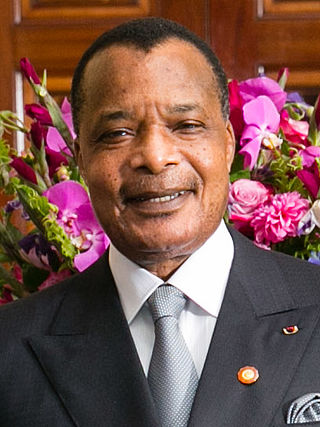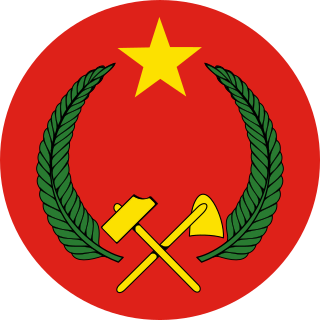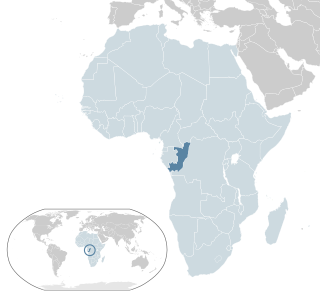Related Research Articles
The history of the Republic of the Congo has been marked by diverse civilisations: Indigenous, French and post-independence.

Marien Ngouabi was the fourth President of the Republic of the Congo from 1969 until his assassination in 1977.

Pascal Lissouba was a Congolese politician who was the first democratically elected President of the Republic of the Congo and served from 31 August 1992 until 25 October 1997. He was overthrown by his predecessor and current president Denis Sassou Nguesso in the 1997 civil war.

Denis Sassou Nguesso is a Congolese politician and former military officer who has served as president of the Republic of the Congo since 1997. He also previously served as president from 1979 to 1992.
Jacques Joachim Yhombi-Opango was a Congolese politician. He was an army officer who became Congo-Brazzaville's first general and served as Head of State of the People's Republic of the Congo from 1977 to 1979. He was the President of the Rally for Democracy and Development (RDD), a political party, and served as Prime Minister from 1993 to 1996. He was in exile from 1997 to 2007.

The Congolese Party of Labour is the ruling party of the Republic of the Congo. Founded in 1969 by Marien Ngouabi, it was originally a pro-Soviet, Marxist–Leninist vanguard party which founded the People's Republic of the Congo. It took a more moderate left-wing stance following the dissolution of the Soviet Union in 1991 and adopted social democracy as its principal ideology in 2006. Denis Sassou Nguesso is the President of the PCT Central Committee, and Pierre Moussa is the Secretary-General of the PCT.
The Union for Democratic Renewal was a coalition of political parties in the Republic of the Congo. The coalition was led by Bernard Kolélas, who was also the leader of the coalition's largest party, the Congolese Movement for Democracy and Integral Development (MCDDI). The URD parties supported the transitional government of Prime Minister André Milongo (1991–1992) and opposed the National Alliance for Democracy (AND), which included the Pan-African Union for Social Democracy (UPADS) and the Congolese Labour Party (PCT). In the parliamentary election held in June–July 1992, the AND parties won a slight majority of seats in the National Assembly and UPADS leader Pascal Lissouba was victorious over Kolélas in the August 1992 presidential election.

Alphonse Massamba-Débat was a political figure of the Republic of the Congo who led the country from 1963 until 1968 in a one-party system.
The Congolese Trade Union Confederation is a trade union centre in Republic of the Congo.

The Second Republic of the Congo Civil War, also known as the Second Brazzaville-Congolese Civil War, was the second of two ethnopolitical civil conflicts in the Republic of the Congo which lasted from 5 June 1997 to 29 December 1999. The war served as the continuation of the civil war of 1993–1994 and involved militias representing three political candidates. The conflict ended following the intervention of the Angolan military, which reinstated former president Denis Sassou Nguesso to power.

Presidential elections were held in the Republic of the Congo in August 1992, marking the end of the transitional period that began with the February–June 1991 National Conference. It was won by Pascal Lissouba of the Pan-African Union for Social Democracy (UPADS), who defeated Bernard Kolélas of the Congolese Movement for Democracy and Integral Development (MCDDI) in a second round of voting.
Stéphane Maurice Bongho-Nouarra was a Congolese politician. He served in the government of Congo-Brazzaville during the late 1960s, and after a long period in exile, he returned and played an important role in the politics of the 1990s. Bongho-Nouarra was briefly Prime Minister of Congo-Brazzaville from September 1992 to December 1992.
Ambroise Édouard Noumazalaye was a Congolese politician who was Prime Minister of Congo-Brazzaville from 1966 to 1968, under President Alphonse Massamba-Débat. Later in life he served as Secretary-General of the Congolese Labour Party (PCT) and was a supporter of President Denis Sassou Nguesso. He served as President of the Senate from 2002 to 2007.
Bernard Bakana Kolélas was a Congolese politician and President of the Congolese Movement for Democracy and Integral Development (MCDDI). Kolélas was a long-time opponent of the single-party rule of the Congolese Labour Party (PCT), and after the introduction of multiparty politics in the early 1990s he was one of Congo-Brazzaville's most important political leaders. He placed second in the August 1992 presidential election, behind Pascal Lissouba; subsequently he was mayor of Brazzaville, the capital, during the mid-1990s, and he briefly served as Prime Minister of Congo-Brazzaville during the 1997 civil war. After rebel forces prevailed in the civil war, he lived in exile for eight years until an amnesty made it possible for him to return; he was then elected to the National Assembly in 2007.
Claude-Ernest Ndalla is a Congolese politician. First coming to prominence as a radical youth leader in 1960s Congo-Brazzaville, he was one of the leading members of the Congolese Labour Party (PCT) in the period immediately following its founding in 1969, but after a few years his career fell into a long decline due to factional struggles within the PCT. Later, he served in the government of Congo-Brazzaville as Minister of Youth Redeployment and Sports from 1997 to 1999, and he has been a Special Adviser to President Denis Sassou Nguesso since 2003.
Pierre Anga (1940–1988) was a Congolese army officer who was an opposition figure to Congolese President Denis Sassou-Nguesso. He formed part of the Military Committee of the Congolese Labour Party which for the period between 18 March 1977 to 3 April 1977 acted in place of the Presidency after Marien Ngouabi was assassinated. Anga was arrested in 1987 for allegedly participating in a coup d'état against the President; during this arrest several soldiers were killed. Shortly after this coup attempt fighting broke out in the North of the country between forces led by Anga and Government forces. He was killed by Congolese security forces. He is reported to have died in the jungle of Ikongono.

M 22 was a political movement in Congo-Brazzaville. It was active in 1972 and 73 before its guerrilla base was compromised and most of its cadre arrested including its leader Ange Diawara.
M 24 was a political movement in the People's Republic of Congo. The grouping emerged from a strike organized on March 24, 1976. The March 24 strike had demanded the rehabilitation of the Central Committee of the Congolese Party of Labour (PCT). The leaders of the strike were arrested. The name 'M 24' was accorded by the Congolese Students Association (AEC) in France in reference to the coalition who backed the March 24 strike.
André Mouélé is a Congolese politician. During the single-party rule of the Congolese Labour Party (PCT), he served in the government of Congo-Brazzaville as Minister of Culture, Arts, and Sports and as Minister of Labour and Justice in the 1970s. After the introduction of multiparty politics, he briefly served as President of the National Assembly of Congo-Brazzaville from September 1992 to November 1992.
Daniel Abibi is a Congolese politician, mathematician and diplomat. During the 1980s, he served in the government of Congo-Brazzaville as Minister of Information and as Minister of Secondary and Higher Education. Later, during the 1990s, he was Congo-Brazzaville's Permanent Representative to the United Nations.
References
- 1 2 Bazenguissa-Ganga, Rémy. Les voies du politique au Congo: essai de sociologie historique . Paris: Karthala, 1997. p. 227